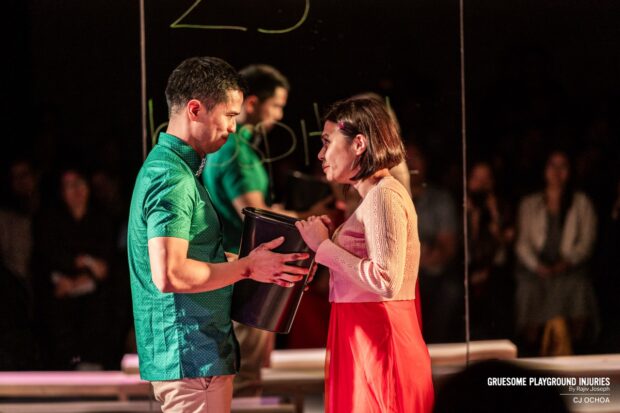
In producing “Ang Apologia ni Sokrates,” a Filipino stage version of Socrates’ “Apology,” the Ateneo de Manila Philosophy Department dealt with the challenge of making a 4th-century intellectual one-man discourse relevant to college students with a short attention span. In fact, the actual text—the final, impassioned self-defense of the condemned but brilliant Greek philosopher Socrates—requires utmost concentration.
The first thing that director Jovi Miroy—playwright and a philosophy professor himself—did is present Socrates’ self-defense as nothing less than a battle between good and evil. There are no gray areas. One is either on the side of the lone angel in pursuit of the truth, or that of his detractors whose emptiness and immorality are exposed bit by bloody bit.
In Tata Tuviera’s gloomy, dark and almost bare production design, the specter of death lingers. Masks present Sokrates’ detractors to be less than human, but Miroy makes them recognizable in today’s world: politicians with hidden agenda, bloggers without a message, and businessmen without a values system.
Feet of clay
Disrupting this darkness is a white-robed Ron Capinding who portrays Sokrates as a seeker of truth, asking only honesty from those he deals with.
He lets loose when he finds himself disappointed, as the so-called guardians of society reveal their feet of clay. It is hard to keep one’s eyes away from Capinding the whole two hours he is onstage. He owns the discourse, believed by scholars to be delivered personally by Sokrates before his judges, and later transcribed by his student and successor, Plato.
The impact of his arguments can be almost visceral, given the Tagalog translation by Fr. Roque Ferriols, SJ, who has pioneered the teaching of philosophy in Filipino for half a century. Capinding could have just stayed in the comfort zone of self-righteous fury, but he goes beyond that—Sokrates as irreverent as a jester, weak-kneed at the thought of his own mortality, and fun-loving as a child.
Bending the timeline
Capinding carries that charm over to the other side when Miroy occasionally breaks the fourth wall. There are moments when the actor’s inner teacher takes over, as he interacts with the college audience. Again, this might be Miroy’s attempt at making the material more relevant. The director also bends the timeline by introducing a suicidal teenager who is wrestling with his own demons, in parallel to Sokrates’ ordeal. The effort is visible, but the two timelines do not quite mesh, leaving more questions than answers.
What emerges in the end is that the uncomfortable questions that the Greek philosopher raised thousands of years ago are still tearing into the fabric of society today. If the viewers can follow those questions in their own individual quest for truth, then our generation just might stand a chance. As Socrates himself kept pointing out (and which this play frequently hammered into our collective consciousness): “The unexamined life is not worth living.” —CONTRIBUTED
“Ang Apologia ni Sokrates” runs until Feb. 23 at Doreen Black Box, Areté, Ateneo de Manila University, with performances on Thursday-Saturday at 8 p.m. and Saturday at 3 p.m. For tickets, call Cholo at 09171009305.














































